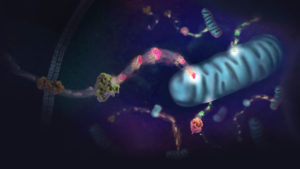
Metabolism underpins numerous cellular processes. Without it, cells would not grow, divide, synthesize or secrete. Another pathway, autophagy, degrades unwanted cellular materials, helping to maintain cell health. With these opposing roles, is there a connection between autophagy and metabolism? As it turns out, the answer is yes. Because molecules degraded by autophagy are recycled and fed into metabolism pathways as precursor compounds. There are interesting implications as a result of this connection, ones that affect cancer cells as described in a recent Cell Metabolism review article.
Autophagic flux, the process by which molecules and organelles are directed to the autophagosome, fuse with the lysosome and are degraded, involves a selective process that determines the cargo carried within the autophagosome. Autophagy-related genes (ATGs) direct the process and particular receptor proteins bind the cargo. What is interesting about the connection among cancer, autophagy and metabolism is the complexity of the role that autophagy plays in cancer. While autophagy was thought to act in a more tumor suppressive manner as shown when one copy of an ATG6 analogous gene in mice was deleted and the other left unaltered, and malignant tumors developed, but in mice mosaic for ATG5 deletions, the inhibition of autophagy resulted in benign tumors in the liver. This latter experiment suggested autophagy was needed for cancer progression, a hypothesis reinforced by the lack of ATG mutations in human cancers.
In addition, autophagy is elevated in tumor cells under hypoxic conditions and during stress such as nutrient starvation or cancer therapies like radiation. When autophagy is inhibited, tumor growth in model systems such as genetically engineered mouse models (GEMMs) slows. In fact, the basal level of autophagy is elevated in many cancers even when nutrients are available.
As described in an earlier blog post on cancer and metabolism, cancer cells will coopt cellular pathways for proliferation. Tumor cells will increase aerobic glycolysis, known as the Warburg Effect, for energy along with changing redox balance and metabolite synthesis as part of the drive to grow. By degrading various molecules, autophagy can feed needed precursors to metabolic pathways (e.g., sugars for glycolysis) when demand increases under neoplastic conditions. This ability to feed into glycolysis has been shown in studies of various cancer types including Ras-driven tumors. However, this increase in autophagy feeding glycolysis damages mitochondria. For pancreatic cancer cells, inhibiting autophagy resulted in reduced oxidative phosphorylation. However, cells fed pyruvate, a precursor in the mitochondrial pathway, were partially rescued and able to grow again. Another study showed autophagy played a role in maintaining amino acid pools for pancreatic cells.
How does autophagy contribute to cancer metabolism?
Cells derived from a Kras-driven lung cancer GEMM with or without ATG7 were used in a metabolic tracing study to define the contribution of autophagy to metabolism. After being fed medium supplied with labeled nutrients for several days, cells were feed unlabeled medium and then starved for a short time. Other than a small increase in glucose uptake and lactate production, most metabolic changes were seen when nutrients were in limited supply. Autophagy was required to maintain energy via oxidative phosphorylation when nutrient starved. The decreased nucleotide pools in starved autophagy-null cells could be rescued by adding nucleosides in combination. In addition, the redox balance was supported by autophagy whether cells were fed or starved.
Interestingly, autophagy not only affects metabolism within a tumor cell but also those cells around it. One example cited was the study of pancreatic cancer and its tendency to grow connective tissue around the tumor, restricting nutrients and oxygen. A specialized fibroblast in the stroma of this surrounding tissue is known as a pancreatic stellate cell and researchers found that these cells secreted alanine. The pancreatic cancer cells took up the alanine and used in the Kreb’s cycle, freeing up glucose to be used other pathways such as synthesizing serine and glycine. Furthermore, the secreted alanine depended on autophagy. That is, when autophagy was inhibited, no alanine was secreted, limiting the growth of pancreatic cancer cells in medium with restricted nutrients. When medium from autophagy-impaired stellate cells was added to pancreatic cancer cells, the lack of alanine negatively affected cancer cell growth. When pancreatic cancer cells were cotransplanted with stellate cells, the tumors took and grew better. Using RNAi that inhibited autophagy in the stellate cells eliminated the growth advantage of the pancreatic cancer. This work and other studies demonstrate that autophagy is involved in crosstalk between different cell types and plays an important role in tumor cell metabolism and growth.
The review article by Kimmelman and White has shown that autophagy and metabolism are linked in cancer cells. Autophagy feeds the metabolism of tumors both within the cell itself as well as by secreting metabolites that can be taken up by nearby cancer cells. These capabilities suggest that autophagy is a viable target for cancer drugs. Evidence continues to mount for multifaceted cancer treatments, thus exploiting the cancer cell’s need for metabolites as well as moderating the ability of autophagy to feed tumor cells under nutrient limited and stressful conditions present viability opportunities for drug development. Being able to hobble a cellular workaround to energy metabolism restrictions may be able to help back cancer in a corner from which it cannot escape.

Interested in sensitive assays to explore changes in metabolism? We have assays for metabolites, glucose uptake, oxidative stress and nucleotide cofactors.
To understand the role of autophagic flux in cells, try our bioluminescent autophagy assay.
Reference
Kimmelman, A.C. and White, E. (2017) Autophagy and tumor metabolism. Cell Metab. 25, 1037-1043. doi: 10.1016/j.cmet.2017.04.004
Sara Klink
Latest posts by Sara Klink (see all)
- A One-Two Punch to Knock Out HIV - September 28, 2021
- Toxicity Studies in Organoid Models: Developing an Alternative to Animal Testing - June 10, 2021
- Herd Immunity: What the Flock Are You Talking About? - May 10, 2021
